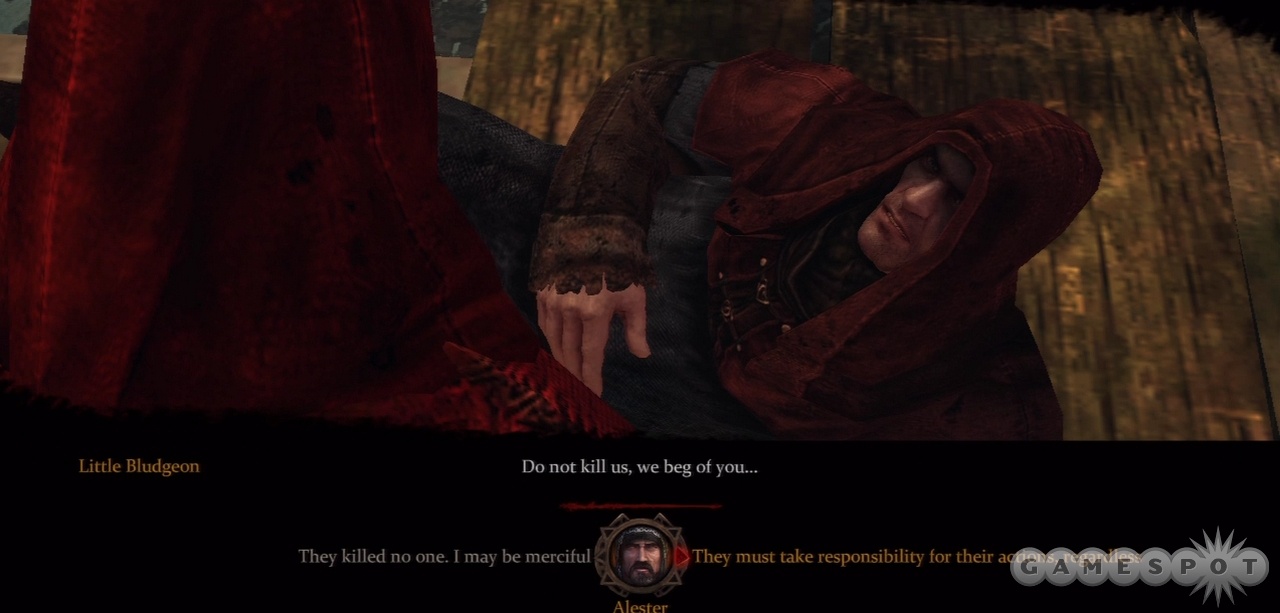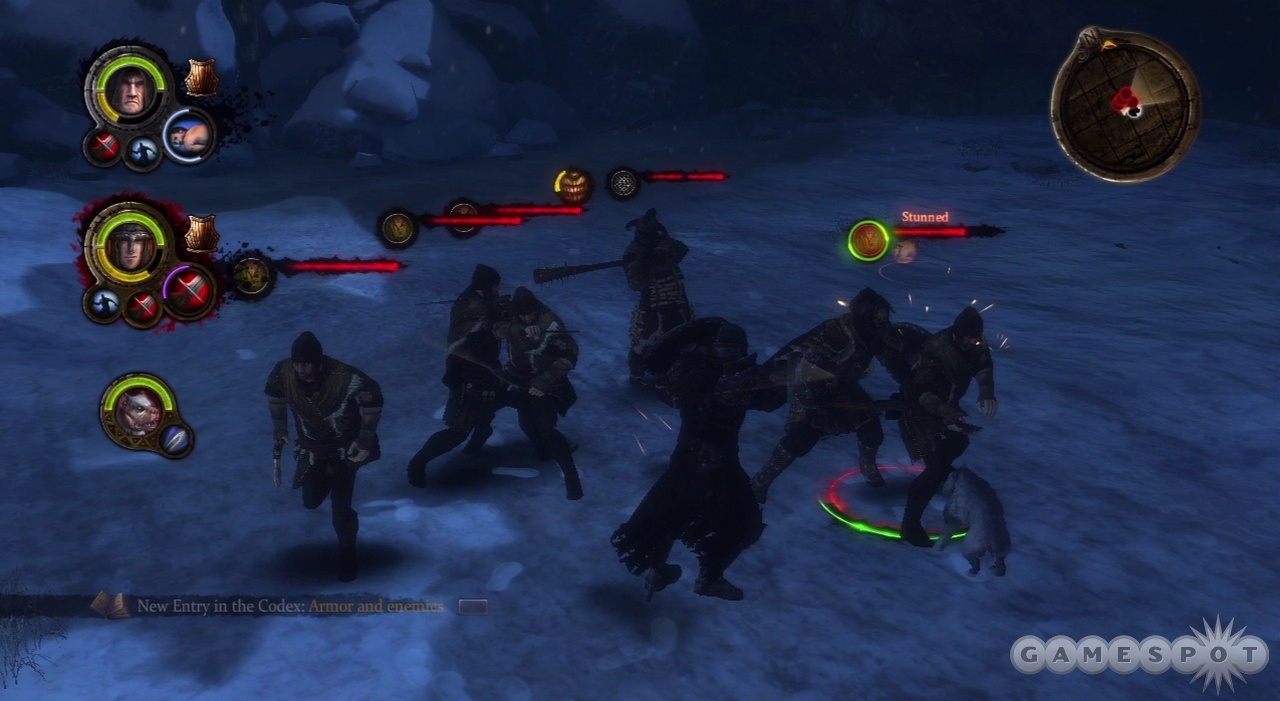The appeal of a novel is readily apparent. Fascinating characters and intricate plots suck you into elaborate worlds, and you furiously flip pages to find out what happens next. But video games are more complex than that. Stories are just one aspect of the total package, and the balance of the various elements determines how effective the adventure is at getting you invested. In Game of Thrones, the story deftly carries the mantle of the book (or the show, for that matter) it's based on, and the addition of moral choices gives impressive flexibility in how events play out. However, the other aspects struggle to keep up their end of the bargain. Confined exploration and entertaining bouts of shallow combat are adequate enough, but are hardly a draw on their own. Thankfully, Game of Thrones pushes its story to the forefront, creating a flawed though memorable addition to the Song of Ice and Fire universe.
Game of Thrones doesn't retell the story of the novel. Rather, the game's story travels a parallel path to the cataclysmic events that rocked a kingdom. You view Westeros through the eyes of two separate characters created just for this adventure, Alester Sarwyck and Mors Westford. Alester returns to his home of Riverspring after spending the last 15 years in self-imposed exile. Merely walking through the gate should, by rights, make him the ruler given that his lord father recently passed, but his conniving bastard brother, Valaar, stands between him and his rightful seat of power. Internal conflicts flare up in Alester as he tries to wrestle power away from Valaar without succumbing to the dirty influences whispering in his ears.
Way up in the north, Mors calls the Wall home and the Night's Watch his family. Trapped in his own exile after he disobeyed orders during the war that placed Robert Baratheon on the Iron Throne, Mors mercilessly slays wildlings and deserters to stay true to the sacred oath he swore. When a letter arrives from the Hand of the King commanding him to protect a mysterious woman, he travels to southern lands to keep her safe.

Both Mors and Alester are strong figures that have a clear idea of the difference between right and wrong. Alester puts his family and townsfolk above all else. He would rather be humiliated at the feet of Queen Cersei than suffer the wrath of her displeasure. The greater good is a burning flame in the back of his mind, always reminding him that things are better for everyone if he doesn't let his pride get in the way. Mors couldn't be more different. He acts with his rigid view of morality in mind at all times. To kneel at the feet of evil is to align yourself with wickedness, so he takes the punishment for his choices without wavering in the slightest.
Dialogue choices determine how others react to your characters. If you approach a prostitute in Mole's Town with insults on your lips and violence in your heart, she may run away instead of offering you the valuable information you require. But if you appear to be a pushover, a clever villager might talk himself out of punishment for a murder he committed. There's no morality judge to keep you in line. You respond in conversations with whatever you most want to say and bear the consequences of your actions. Regardless of what card you play, the world changes slightly as you get deeper into the story. Alliances are frequently forged and destroyed, so choose carefully. There are five different endings based on what you do in the last chapter, but the bigger changes occur throughout the adventure as characters are either present or absent based on how you treated them earlier.

For the most part, Game of Thrones stays true to the world George R. R. Martin created. A web of intrigue stretches from the crown in the Red Keep all the way north to the Wall. Black Brothers fight wildlings, Gold Cloaks keep peace based on the Lannisters' whims, and everyone mutters quietly of the Others who reside where snow flourishes. Occasional missteps feel out of place for those intimately familiar with the source material, but aren't egregious enough to take you out of the experience. For instance, as in most role-playing games, you have a healthy assortment of armor to clothe your characters in. However, draping a Lannister cloak over Alester's shoulders is just strange, and there's no reason Strong Belwas' gauntlets should be in a Westeros dungeon. Plus, why are street vendors selling wild fire? But such discrepancies are nitpicky considering how true to the books most of this game is.
The only time the story stumbles is in the dialogue. Certain characters are dangerously close to being gruff caricatures rather than fully realized people, existing only as easy straw men to tear down. And though the main cast is well acted, supporting characters are woefully inconsistent. Thankfully, the dialogue is good most of the time. And the villains are just as fleshed out as the heroes. Valaar is particularly well crafted. A bastard who was spat on for most of his life, Valaar has a thirst for power that's so overwhelming that he performs any act, no matter how insidious, to curry favor with the queen. Violence bubbles under the surface of every conversation with him, making you yearn for the moment when you can thrust your sword through his throat.
Story makes up the vast majority of this adventure. This is a good thing because the elements surrounding the plot can't reach the lofty heights of the story. Combat thrusts so many ideas at you early on that it's initially overwhelming. Attributes and percentages flood the screen, and though a tutorial spells out what everything means, there are so many things to keep track of that you fear you're missing something important. Which sword should you use against heavy armor? What does it mean when an enemy starts bleeding? These answers become second nature in time, and it's when everything clicks that it becomes apparent just how simple the combat system really is.
Action takes place in real time. To select an attack, you bring up a radial menu that slows everything down to a crawl but doesn't pause the action. This is a smart system because it keeps you moving and attacking while still giving you just enough time to plan out your line of attack. Your repertoire is loaded with all manner of different moves. Buffs, defensive feints, offensive strikes, potions, and an assortment of other abilities populate your move menu, and figuring out the best time for each of these requires some thought. But the most important of your tools is the interrupt attack. This freezes your enemies in place, making them vulnerable to any offensive volley. Once you unlock a couple of attacks that interrupt, you can hack away at your foes with little chance of failure. Although this doesn't always work in large groups, it's so effective in the majority of battles that you can cheese your way to victory without worrying about the complex system that lies underneath.
Despite its exploitable nature, combat still manages to be fun. This is in part because it's entertaining to pick on enemies who are weaker than you. Choose the archer class, and you can pepper your enemies with arrows from one foot away while they struggle to stand up. Silly? You bet. A little levity can go a long way, even in Westeros. From a more practical standpoint, each character has a special ability that is empowering to use. Alester is a red priest who has an unhealthy obsession with fire. Set your foes alight, and watch them run around like burning chickens, ensuring that all of their buddies enter the same hellish torment. Mors has an even better trick. He's a warg, so he can inhabit the body of his lovable dog. Scare attackers with your mighty bark, or lunge at their throats with your chopping teeth. You can control your dog outside of combat as well, to track the scent of a fleeing coward or squeeze through a hole in the wall, and this adds some diversity to the exploration.
Even with this dog trick, exploring Westeros isn't that exciting. A half dozen or so locations dot the map, and you fast travel wherever the story tells you to. Once you're in these locales, there's plenty of room to stretch your legs, but the mighty continent feels smaller when you're not walking the land. At least once you arrive at your destination there are interesting side quests to take part in. The fetch quests that make up many role-playing games are absent here, replaced by tasks that require you to make use of your intuition instead. For instance, you might have to preside over a group of suspected felons. Once you listen to their side of the story, you decide whether to set them free or send them to jail, and there's nothing to tell you if your decision was just. Having such power in your hands is a great feeling, so these side missions are a welcome change of pace.

Sadly, even though there are many good aspects in Game of Thrones, you never quite feel as if you're in Westeros. Aged technology with bland artistic design fails to match the majestic vision of this world the books create. Muddy textures and quirky animations abound, and though they aren't egregious enough to pull you out of the story, they fail to draw you further in. Most troubling is how lifeless the cities are. Flea Bottom should be nearly bursting with squalid peasants desperate to survive, but only a smattering of people mill about these parts. Westeros doesn't feel lived in, so even though the visuals do an adequate job, they don't do the great story justice.
Game of Thrones serves as a worthy companion to the novels because it introduces a storyline and characters that fit right in with George R. R. Martin's world. But the story is the only element that's worthy of this great heritage. The other aspects are competently done, but all have enough flaws to serve as a distraction at times. Thankfully, the focus is clearly placed on the story, and those other parts are pleasant enough to get through that the flaws won't derail your fun. Game of Thrones weaves together an enticing string of events that makes it difficult to pull away from.